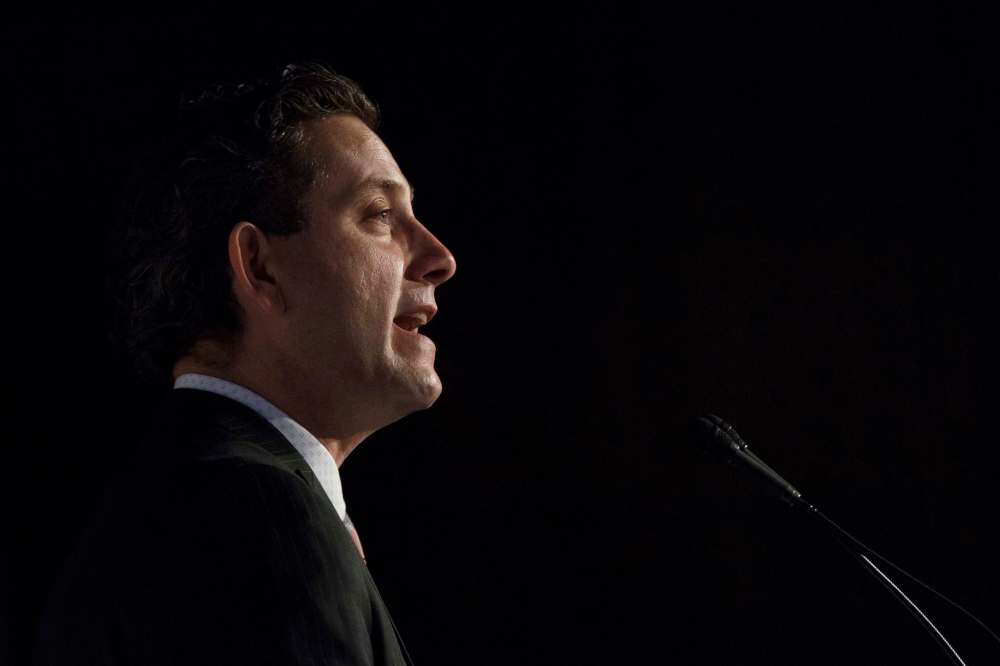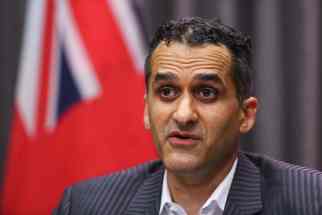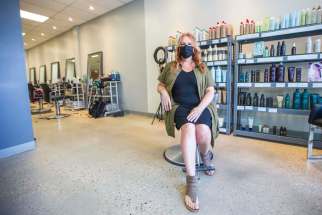Vaxxed and at your service Employers face challenges on what they can — and cannot — mandate in the workplace
Read this article for free:
or
Already have an account? Log in here »
To continue reading, please subscribe:
Monthly Digital Subscription
$0 for the first 4 weeks*
- Enjoy unlimited reading on winnipegfreepress.com
- Read the E-Edition, our digital replica newspaper
- Access News Break, our award-winning app
- Play interactive puzzles
*No charge for 4 weeks then price increases to the regular rate of $19.00 plus GST every four weeks. Offer available to new and qualified returning subscribers only. Cancel any time.
Monthly Digital Subscription
$4.75/week*
- Enjoy unlimited reading on winnipegfreepress.com
- Read the E-Edition, our digital replica newspaper
- Access News Break, our award-winning app
- Play interactive puzzles
*Billed as $19 plus GST every four weeks. Cancel any time.
To continue reading, please subscribe:
Add Free Press access to your Brandon Sun subscription for only an additional
$1 for the first 4 weeks*
*Your next subscription payment will increase by $1.00 and you will be charged $16.99 plus GST for four weeks. After four weeks, your payment will increase to $23.99 plus GST every four weeks.
Read unlimited articles for free today:
or
Already have an account? Log in here »
Hey there, time traveller!
This article was published 02/07/2021 (1619 days ago), so information in it may no longer be current.
Eve Rice’s Instagram is a flurry of colour.
She’s a hairstylist with 100 clients, give or take. Many of the cuts and colours she shares online are bright pinks, purples and blues, balanced with more subdued hues. She works with Vincenzo Shampoo salon on Pembina Highway, but she manages her own clientele through social media.
Beyond the theatrical hairstyles she posts, Rice now sticks out from her fellow Winnipeg stylists through a simple addition to her bio.
“All welcome,” it reads, and then, in parentheses, “second dosed” — with emojis of a flower and a needle.
Rice is part of a growing community of workers who include their vaccination status as part of their introduction to customers. She weighed the issue before deciding to reveal her status. She knows some clients would feel uncomfortable with staff being open about their vaccination status, but she believes it will comfort her regular clients and attract new ones.

“I feel I have to market a little bit,” she said. “But I feel I’m kind of nuanced about it, I kind of joke about it — I’m ‘second dosed,’ saying ‘second dosed’ to kind of make it light, but it’s serious.”
It’s a light at the end of a difficult tunnel for Rice, who had to “fire” five of her own clients after they asked her to break the law and make house calls during lockdown periods.
While she’s proud to be fully vaccinated, she and her coworkers at Vincenzo Shampoo decided not to publicly discuss their vaccination status with clients at the salon or each other. But through their own personal social media, it was up to them.
“Anyone who came in and started showboating about it, and saying ‘I hope you ladies are vaccinated,’ or something, I’d just go, ‘Actually, we don’t talk about it,’” she said. “Of course, we’re responsible hairdressers, but it’s better to do that than make people feel awkward.”
The question about whether employers can — or should — require employees to prove they’ve been fully vaccinated before they’re allowed back in the workplace is one that will become more prevalent as second doses ramp up across the province, said ethicist Arthur Schafer.
The issue is whether it’s possible to give employers this power without putting people’s privacy and personal freedom at risk.

“You have to look at each situation, and you have to ask, we’re talking about restricting people’s liberty, is it necessary in this case? Are we restricting their liberty as minimally as possible?” he said. “Maybe it’ll be necessary to restrict their liberty, but maybe they don’t have to do it so drastically, maybe you could do it in a less draconian, less coercive way… will this do more harm than good, or is it going to produce more good than harm?”
Schafer expects employers will be required to make “reasonable accommodations” to those who aren’t able to be vaccinated such as at-home work placements and rapid COVID-19 tests.
But the issue gets trickier when employers are faced with workers who can get vaccinated, but won’t for personal reasons — an issue that’s been fought in the courts in the past.
“Various retail health authorities in Canada have tried to require their employees to get the seasonal flu shot. They’ve made it a requirement. And mostly in those cases, when they have been litigated, the employers have lost,” he said.
However, COVID-19’s unique position as a more dangerous illness with an effective vaccine might turn the law in favour of mandated immunizations, Schafer said, adding it’s more likely that any legal cases would be approached on a case-by-case basis, rather than the federal government providing sweeping legislation on the issue.
“You have to look at each situation, and you have to ask, we’re talking about restricting people’s liberty, is it necessary in this case? Are we restricting their liberty as minimally as possible?” – Ethicist Arthur Schafer
“Based on employment law, there are challenges to employers all the time by individual workers and unions, and they succeed when the employer’s requirement is unreasonable or the employer has failed to make these accommodations,” he said. “They succeed when the requirement is genuinely necessary, there’s good evidence.”
Any mandated proof of vaccination in a workplace would likely exempt people who can’t be immunized for medical or religious reasons under human rights legislation, and most unionized workers wouldn’t see that type of ruling stick, said Olivia Cicchini, an employment law specialist with Peninsula Canada, a Toronto-based human resources and health and safety consulting firm.
“If your workplace is in Canada and it’s not unionized, employers can terminate employees for any reason at any time as long as that reason is not discriminatory,” Cicchini said.
“If an employee chooses not to get vaccinated just because of personal choice, the employer could choose to terminate them on a without-cause basis and provide them with their termination pay.”
The question about what employers can ask of their staff is prevalent right now, said Winnipeg Chamber of Commerce president Loren Remillard.
The chamber is working with the Manitoba Employers Council and is pushing for a legal opinion on the rights and responsibilities of employers related to imposing vaccination requirements.

“There are cases where employers do have the right to ask employees for proof of vaccination… there is precedent where it is a requirement of your position to be able to provide that proof,” he said.
The issue is threefold, Remillard said; the responsibility of employers to provide a safe environment for workers, the issue of a worker’s right to privacy in relation to their health information, and the issue of accommodating those who aren’t able to get vaccinated.
“We would encourage all employers, make sure if you’re bound by collective agreement, make sure that you’re reviewing that, if you have access to legal advice, make sure you’re seeking independent legal advice for your company,” he said.
Rice gets emotional when asked about the reality that some people will choose not to get vaccinated; her father suffered through COVID-19.
“I don’t know how anybody couldn’t have done it by now,” she said. “It’s actually selfish in my mind.”
However, she isn’t looking for her workplace to mandate proof of immunization. She hopes her fellow stylists will get vaccinated — and publicly share their status — but she doesn’t want them to be alienated over it.
“I’m a little 50-50 about it. Our privacies are at stake… I think it depends on what situation you’re in,” she said.
— With files from The Canadian Press
malak.abas@freepress.mb.ca
Twitter: malakabas_

Our newsroom depends on a growing audience of readers to power our journalism. If you are not a paid reader, please consider becoming a subscriber.
Our newsroom depends on its audience of readers to power our journalism. Thank you for your support.









